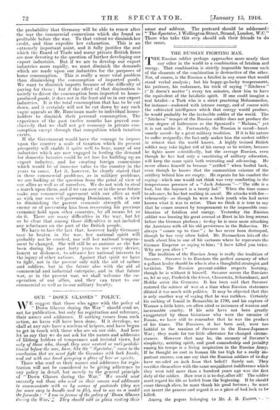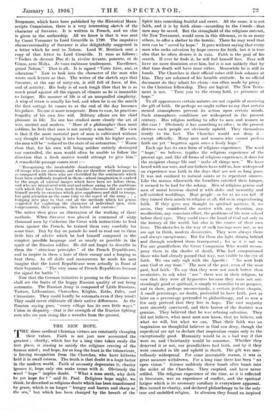THE RUSSIAN FIGHTING MAN.
HE Russian soldier perhaps approaches more nearly than any other in the world to a combination of fatalism and energy. That combination is strictly impossible because each
of the elements of the combination is destructive of the other. Nor, of course, is the Russian a fatalist in any sense that would stand verbal analysis ; but his happy-go-lucky temperament, his patience, his endurance, his trick of saying " Nitchevo " (" It doesn't matter ") every ten minutes, show him to have the equivalent of the fatalistic spirit. If one could imagine a real fatalist—a Turk who is a strict practising Mohammedan, for instance—endowed with intense energy, and of course with the cultivated intelligence which that energy would produce, he would probably be the invincible soldier of the world. The ".Nitchevo" temper of the Russian soldier does not produce the same degree of listlessness as the Spaniard's " lifaiiana," yet it is not unlike it. Fortunately, the Russian is saved—hand- somely saved—by a great military tradition. If it is his nature to suffer resignedly, the fact only makes him the coolest soldier in retreat that the world knows. A highly trained British soldier may take higher toll of his enemy as he retires, because he fights more scientifically, but the average Russian, even though he has had only is smattering of military education, will keep the same spirit both retreating and advancing. Ho never allows himself to become " rattled " when hurled back, even though he knows that the ammunition caissons of the artillery behind him are empty. He repeats for his comfort the saying—which one would not think was very comforting in the tempestuous presence of a "Jack Johnson "—" The rifle is a fool, but the bayonet is a trusty lad." When the time comes to advance, he has lost nothing in moral. He attacks with-fire- vehemently—as though he were a fresh youth who had never known what it was to retire. Thus we think it is true to say that he comes nearest by temperament to the impossible com- bination of fatalism and energy. Yesterday the Russian soldier was burning his great arsenal at Brest in his long retreat before the German phalanx ; to-day he is once more attacking the Austrians with all his old persistence in the Bukovina. He always "comes up to time " ; he has never been destroyed, though he has very often failed. Mr. Raemaekers hits off the truth about him in- one of his cartoons where -he represents the German Emperor as Saying. to him: "I have killed you twice. Why are you alive ? "
The tradition of the Russian Army is really the tradition of
Suvarov. Suvarov is to Russians the perfect memory of what a gallant leader should be who is also a thoughtful strategist and tactician. The Russian peasant-soldier respects learning, though he is without it himself. Suvarov serves the Russians as, let us say, Frederick the Great, Clausewitz, Scharnhorst, and
Moltke serve the Germans. It has been said that Suvarov
restored the science of war at a time when Russian statesmen diluted it too much with polities. It may be objected that this is only another way of saying that he was ruthless. Certainly his sacking of Ismail in Bessarabia in FM, and his capture of Warsaw a little later, are often cited as instances of wanton and inexcusable cruelty. If his acts have not been greatly exaggerated by those historians who were the enemies of Russia, we have still to remember that he was the product of his times. The Russians, it has been said, were too faithful to the maxims of Suvarov in the Russo-Japanese War; they made far too little allowance for changed circum- stances. However that may be, the memory of Suvarov's simplicity, untiriug spirit, and good comradeship and joviality among his troops is a living inspiration in the Russian Army. If he thought no cost in human life too high for a really im- portant success, can one say that the Russian soldiers of to-day have rec eded an inch from that belief? Surely not. They sacrifice themselves with the same magnificent indifference which they were told more than a hundred years ago was the first duty of the soldier. How true it is to-day,after all! The soldier must regard his life as forfeit from the beginning. If he should come through alive, he must thank his good fortune ; he must not invert the process and regard it as a piece of bad luck to bie killed. -
Among the papers belonging to Mr. J. B. Fortesc ••
Dropmore, which have been published by the Historical Manu- scripts Commission, there. is a very interesting sketch of the character of Suvarov. It is written in French, and no clue is given to the authorship. All we know is that it was sent by Count Voronzov to Lord Grenville in 1799. The impulsive utconventionality of Suvarov is also delightfully suggested in a letter which he sent to Nelson. Lord W. Bentinck sent a copy of that letter to Lord Grenville. It runs as follows : "Techez de deveuir Due d3 Is riviere levante, ponente, et de Genes, avee Malta. Je vous embrasse tendrement. Excellence, grand Nelson." That is all. It is signed "Votre frere, ami, et adorateur." Now to look into the character of the man who wrote such letters as that. The writer of the sketch says that Suvarov, at the age of sixty-six, is still full of force, of fire, and of activity. His body is of such tough fibre that he is as much proof against all the rigours of climate as he is insensible to fatigue. His manner of life is of an unequalled simplicity. A wisp of straw is usually his bed, and when he is on the march the first cottage he comes to at the end of the day becomes his palace. No one is more temperate. Born to ease, he practises frugality of his own free will. Military affairs are his chief pleasure in life. No one has studied more closely the art of war, ancient and modern. "More of a philosopher than most soldiers, he feels that man is not merely a machine." His view is that if the more material part of man is cultivated without any thought of bringing it into harmony with his higher parts, the man will be " reduced to the state of an automaton." "Worse than that, for his own. will being neither entirely destroyed 'Jur controlled, the man would often be unable to follow the direction that a fresh motive would attempt to give him." A remarkable passage comes next :- "Recognizing the incalculable disadvantage which belongs to v.11 troops who are automata, and who are therefore without passion, as compared with those who are electrified by the sentiments which have been studiously inspired in them—whose imagination is exalted by the magic of various images which have been set before them, and who are intoxicated with zeal and ardour owing to the ambitions with which they have been made familiar—Suvarov did not confine himself merely to exercises which give suppleness and skill to troops, but paid attention at the same time to the esprit of the army . . . bringing into play to that end all the methods which his genius suggested for exploiting the character of individual men, their temperament, their opinions, their habits and customs."
The writer then gives an illustration of the working of these methods. When Suvarov was .placed in command of sixty thousand men by Catherine the Great with instructions to lead them against the French, he trained them very carefully for some time. Day by day on parade he used to read out to them little bits of advice which he had himself composed in the simplest possible language and as nearly as possible in the spirit of the Russian soldier. He did not forget to describe to them the "atrocious principles" of the French Republicans, and to inspire in them a hate of their enemy and a-longing to beat them. In all drills and manoeuvres he made his men imagine that the bated Republicans were actually in front of their bayonets. "The very name of French Republican became the signal for battle" !
Now that the German initiative is passing to the Russians we shall see the fruits of the happy Russian quality of not being automata. The Russian Army is composed of Little Russians, Tartars, Lithuanians, Chuvashes, Kirghiz, Esths, Poles, and Circassians. They could hardly be automata even if they tried ! They could never obliterate all their native differences. As the Russian saying goes, "every village has its own little ways." Union in disparity—that is the strength of the Russian fighting men who are now rising like a wrestler from the ground.



































 Previous page
Previous page